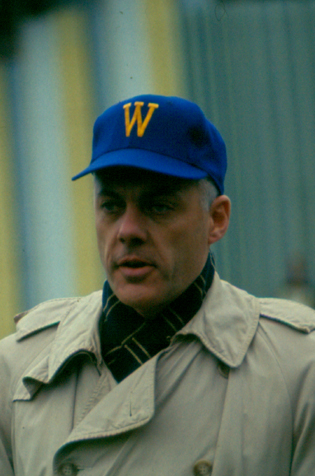Harold Peter Grant Jr. was born on May 20, 1927 in Superior, Wisconsin. That was the day that Charles Lindbergh took off from Long Island for Paris. His mother called him "Buddy Boy," which was shortened to "Bud." He starred in baseball, football and basketball at Superior Central High School, which has since been consolidated with another school. He played football under coach Paul Brown at the Great Lakes Naval Training Station in Chicago during World War II. He played end, both offensive and defensive, at the University of Minnesota, under their greatest coach, Bernie Bierman.
The Philadelphia Eagles selected him in the 1st Round of the 1950 NFL Draft. They had won the last 2 NFL Championships, but fell to 7-7 in 1950. In 1951, he caught 56 passes for 997 yards, in each case 2nd in the NFL. But it would be his last season as an NFL player. He also played 2 seasons for the Minneapolis Lakers, along with George Mikan, and was a member of their 1950 NBA Championship team.
The Winnipeg Blue Bombers, of what would become the Canadian Football League, had been interested in him out of Minnesota, and were willing to pay him more than the Eagles. So he became the 1st NFL player ever to play out his option and leave for another team. He was a 3-time Western Conference All-Star, leading the league in receptions 3 times and receiving yards twice. They reached the Grey Cup, Canada's "Super Bowl," in 1953, but lost.
In 1957, the Blue Bombers named Grant their head coach, before his 30th birthday, making him the youngest head coach in CFL history. He led them to the Playoffs in his 1st 6 seasons, and 8 of his 10. He won the Grey Cup in 1958, 1959, 1961 and 1962, and reached it but lost it in 1957 and 1965. An awful 1-14-1 season in 1964 dragged him down to 102-56 for his CFL tenure.
In 1961, Max Winter, founding owner of the Minnesota Vikings, asked Grant to be the team's 1st head coach. He turned them down, and they hired Norm Van Brocklin instead. After firing Van Brocklin following the 1966 season, Winter offered Grant the job again. This time, he took it, and got the Vikings into the Playoffs in his 2nd season. In 1969, he led them to the NFL Championship. This made him the 1st coach to lead a team into both a Grey Cup and a Super Bowl. In all the years since, Marv Levy is the only other coach to do it.
But they lost Super Bowl IV to the AFL Champion Kansas City Chiefs, the last game before the AFL-NFL merger. He led them to 12 Playoff berths, 11 NFC Central Division Championship, 5 NFL or NFC Championship Games, and 4 NFL or NFC Championships: 1969, 1973, 1974 and 1976.
But they never won a Super Bowl: They lost Super Bowl VIII to the Miami Dolphins, Super Bowl IX to the Pittsburgh Steelers, and Super Bowl XI to the Oakland Raiders. Their "Purple People Eaters" defense was one of the best in the game. But despite having Fran Tarkenton as quarterback and Chuck Foreman as running back, their offense was usually just not quite good enough. In 4 Super Bowls, they scored a total of 34 points. The Raiders scored 32 on them in Super Bowl XI alone.
He retired after the 1983 season, but after a 3-13 season under Les Steckel, Grant was enticed back for 1985, went 7-9, and gave it up for good. His record as NFL coach was 161-99-5.
Grant became an environmental activist in his retirement. He was inducted into both the Canadian Football and Pro Football Halls of Fame. The Blue Bombers dedicated a statue of him outside IG Field. Both they and the Vikings inducted him into their rings of honor.
In 1950, he married Patricia Nelson. They became the parents of 6 children: Kathy, Laurie, Peter, Mike, Bruce and Danny. Mike also went into coaching, leading Eden Prairie High School, in the Minneapolis suburbs, to 11 State Championships.
Bud Grant outlived his wife Pat, who passed away in 2009; and their son Bruce, in 2018. He also outlived several stadiums where he coached: Winnipeg Stadium, the University of Minnesota's Memorial Stadium, Metropolitan Stadium in the Minneapolis suburb of Bloomington, and the Metrodome.
A frequent guest at Vikings games at U.S. Bank Stadium, he died on March 11, 2023, from the effects of Parkinson's disease, at his home in Bloomington. He was 95 years old.
With his death, Bob Harrison is the last surviving member of the 1950 NBA Champion Minneapolis Lakers (he was already the last survivor of their 1952 and 1953 titlists).



_(cropped).jpg)

No comments:
Post a Comment